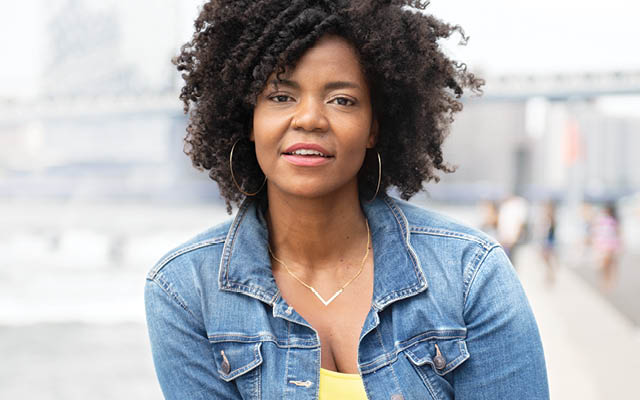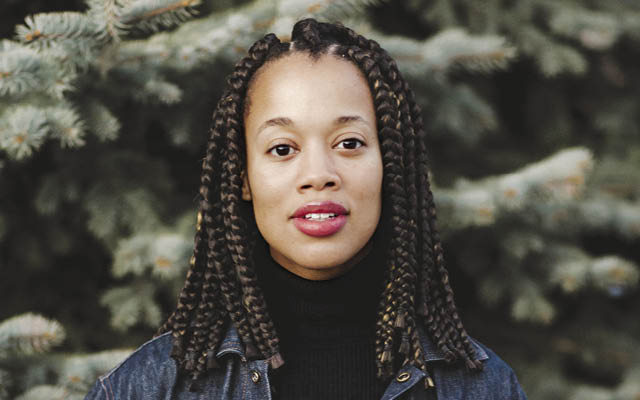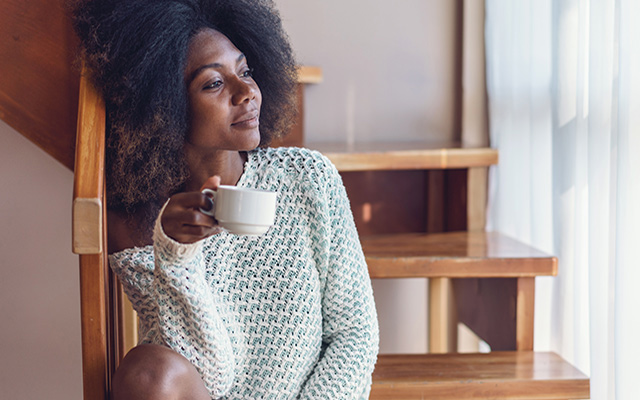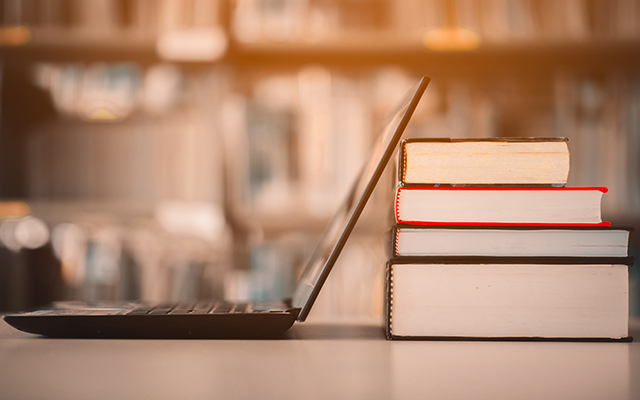The first time Chrissy King stepped up to a barbell, she was unconvinced. Like many women in their 20s, she had joined a gym with one motivation in mind: to lose weight.
“That was the only reason, really — I wanted to be skinny.” Her plan of attack had involved cardio equipment and food tracking, but her trainer had another idea: powerlifting.
The sight of other women pressing, deadlifting, and squatting — and trying the back squat herself — opened her mind to new possibilities.
“It was something about having that barbell on my back that made me feel so strong and empowered in a way that I’d never felt before,” says the Brooklyn, N.Y.–based coach, writer, and inspirational speaker.
In the ensuing months, her body changed — not just in how it looked, but in what it could do. Workouts felt easier, her strength increased, and her confidence soared. King realized it was time to rewrite her personal story.
Growing up in Milwaukee, a highly segregated city with one of the highest incarceration rates of Black men within one ZIP code, King had been homeschooled before her parents -enrolled her in a private Christian school. She was one of three Black students — the other two being her sister and brother.
When her older brother transferred to a public high school, she begged her parents to allow her to follow him. But even immersed in a diverse student body, King saw classmates self-segregating by race.
“I felt really weird when I first got there, because I didn’t feel like I knew exactly where I was supposed to be or where I really belonged,” she recalls. “I was frequently told by kids who were Black that I sounded white; and then I was hanging out with white kids, but I didn’t feel like I exactly belonged there either. I was code-switching for the first time as a young kid and trying to fit into the right spaces in the right ways.”
While she navigated questions of identity at school, the running joke in her family was that she was the “weak” sibling, a message she didn’t contest — not until she started powerlifting years later.
“I started to think, If that part of my story isn’t true, what other parts of my story outside of the gym aren’t true?” she says of the weak-sister storyline. “I was playing small in lots of areas of my life, and I was telling myself these stories of what I could and couldn’t do. Most of them simply weren’t true.”
King went on to earn her personal-training certification but still battled the voices, both internal and external, that suggested she shrink and shape her body even further.
The low point came on a weekend trip where she sat in the car eating a prepared, portion-control meal in the parking lot of a restaurant while her family dined inside. With permission from the waitstaff, she took her meal inside to join her family. “They [were] having this wonderful food experience and enjoying themselves, and I was so miserable,” King recalls. “I was just like, What am I doing?”
King decided then and there to take a different approach. She shifted her focus to the unseen benefits of moving regularly and nourishing herself fully, such as having more energy and improved mental health.
As her relationships to fitness and food healed, she applied the same approach in her coaching. “I would ask people things like, ‘How do you want to feel? How much energy do you want to have? Do you want to be able to play with your kids and not be out of breath?’”
By transforming her story away from the “weak” narrative, King stumbled upon a mission that not only led her on a new personal path but influenced how she could effect positive change in the world. Her personal-training career evolved to include speaking events, writing gigs, teaching engagements, and leadership in the Women’s Strength Coalition, all of which center on the importance of sharing our stories.
These include the false narratives that keep us small as individuals, as well as systemic narratives that oppress BIPOC (Black, Indigenous, and people of color), LGBTQIA+ people, people with disabilities, and others.
“You can’t really have these conversations without understanding that the underlying theme to all of these things is white supremacy,” says King, who is now a lecturer on anti-racism for fitness professionals.
King has emerged as a thought leader in decolonizing wellness: Moving away from the unattainable Western standard can help people find true body liberation — if, she says, we are courageous enough to engage in the conversation.
Experience Life | In mainstream media, we tend to see a singular representation of health and fitness. What’s the problem with a narrow storyline?
Chrissy King | Those of us who have been in the fitness industry for a long time have known people who, on the outside, may look like they’re the picture of health and fitness — but internally, they are having a lot of issues. We have to reevaluate the idea that health is related to a particular look, that it’s just based on the number on the scale, and instead think about what that means for each person.
EL | We hear a lot about body positivity, body neutrality, and body inclusivity. You’ve been promoting “body liberation.” How does that differ?
CK | Body positivity was meant to support people who were on the outskirts of what is considered beautiful in the mainstream. It took hold in fat bodies or queer bodies or Black and brown bodies [in defiance of] the Western standards of beauty. Unfortunately, it has been co-opted by thinner white women who pick at their flaws.
What I love about the body-positivity movement is that it’s been a gateway for people to start having these dialogues about what it means to love and accept yourself in your skin.
Talking about body love can be really hard because of the messaging we’ve seen in mainstream media and the mainstream fashion industry. And I think self-love sometimes oversimplifies that fact, depending on what type of body you exist in. So, we have to really talk about how systems of oppression are set up to disadvantage some people and make [body love] more challenging.
Body liberation, at its essence, is “I am more than my body”: My body has no attachment to my inherent worth as a person. Liberation recognizes the human experience in that, some days, you look in the mirror and think you look amazing, and other days, you judge yourself.
It also allows us to work toward treating ourselves with kindness and compassion — the same kindness and compassion and care that I would show to my best friend or a family member or my partner or my child.
EL | Let’s talk about systems of oppression, which play an important role in this conversation.
CK | All of these concepts are very much steeped in the patriarchy and, ultimately, white supremacy. There’s a wonderful book called Fearing the Black Body by Dr. Sabrina Strings that addresses the connection between fat phobia and racism.
It’s so important for those in the wellness and fitness industries to be having conversations about anti-racism. We need to be individually looking at the ways that we may be participating — and if not participating, at least being complicit — within the systems.
We need to start calling out the fat phobia within the fitness industry and the wellness industry. We need to start questioning the ideas about bodies and the ideas about fat loss automatically meaning that you’re healthier.
We need to start looking into things that could help at every size. How are we working to unlearn our own belief systems so that we are able to help people from all backgrounds, no matter who they are, to reach their health and fitness goals in ways in which they feel celebrated and welcomed and seen and understood?
EL | Whether it’s racism or body size, it seems like our society has a hard time engaging in these conversations.
CK | It’s uncomfortable, but discomfort is part of the process of achieving anything that we want to accomplish. Discomfort is a beautiful thing.
When I started strength training, that first session was wildly uncomfortable. My body was uncomfortable the next few weeks, but I recognized that something wonderful was happening, and so I kept doing it. The same discomfort applies to having conversations around racism and bias.
EL | What are your hopes for the future of the fitness industry?
CK | The thing that I’m always remembering is that this is a marathon, not a sprint, and it’s going to take time to create spaces that are truly diverse and inclusive and keep anti-racism at the forefront of that plan. It’s not something that happens overnight.
I would love to see diversity and inclusion become an integral part of mainstream fitness and wellness spaces: When you walk into a gym or any type of wellness environment, every place has an anti-racism policy. Everybody has a diversity and inclusion policy. Every place has community agreements outlining expectations for how community members treat one another.
When I think about the benefits of fitness and wellness, they really are for everyone.




This Post Has 0 Comments